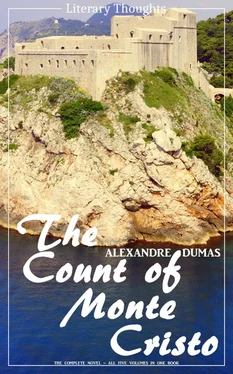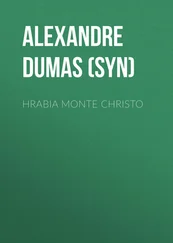"Yes, you're right," replied the companion.
"What's the knot for?" thought Dantes.
They deposited the supposed corpse on the bier. Edmond stiffened himself in order to play the part of a dead man, and then the party, lighted by the man with the torch, who went first, ascended the stairs. Suddenly he felt the fresh and sharp night air, and Dantes knew that the mistral was blowing. It was a sensation in which pleasure and pain were strangely mingled. The bearers went on for twenty paces, then stopped, putting the bier down on the ground. One of them went away, and Dantes heard his shoes striking on the pavement.
"Where am I?" he asked himself.
"Really, he is by no means a light load!" said the other bearer, sitting on the edge of the hand-barrow. Dantes' first impulse was to escape, but fortunately he did not attempt it.
"Give us a light," said the other bearer, "or I shall never find what I am looking for." The man with the torch complied, although not asked in the most polite terms.
"What can he be looking for?" thought Edmond. "The spade, perhaps." An exclamation of satisfaction indicated that the grave-digger had found the object of his search. "Here it is at last," he said, "not without some trouble though."
"Yes," was the answer, "but it has lost nothing by waiting."
As he said this, the man came towards Edmond, who heard a heavy metallic substance laid down beside him, and at the same moment a cord was fastened round his feet with sudden and painful violence.
"Well, have you tied the knot?" inquired the grave-digger, who was looking on.
"Yes, and pretty tight too, I can tell you," was the answer.
"Move on, then." And the bier was lifted once more, and they proceeded.
They advanced fifty paces farther, and then stopped to open a door, then went forward again. The noise of the waves dashing against the rocks on which the chateau is built, reached Dantes' ear distinctly as they went forward.
"Bad weather!" observed one of the bearers; "not a pleasant night for a dip in the sea."
"Why, yes, the abbe runs a chance of being wet," said the other; and then there was a burst of brutal laughter. Dantes did not comprehend the jest, but his hair stood erect on his head.
"Well, here we are at last," said one of them. "A little farther – a little farther," said the other. "You know very well that the last was stopped on his way, dashed on the rocks, and the governor told us next day that we were careless fellows."
They ascended five or six more steps, and then Dantes felt that they took him, one by the head and the other by the heels, and swung him to and fro. "One!" said the grave-diggers, "two! three!" And at the same instant Dantes felt himself flung into the air like a wounded bird, falling, falling, with a rapidity that made his blood curdle. Although drawn downwards by the heavy weight which hastened his rapid descent, it seemed to him as if the fall lasted for a century.
At last, with a horrible splash, he darted like an arrow into the ice-cold water, and as he did so he uttered a shrill cry, stifled in a moment by his immersion beneath the waves.
Dantes had been flung into the sea, and was dragged into its depths by a thirty-six pound shot tied to his feet. The sea is the cemetery of the Chateau d'If.
Chapter 21 – The Island of Tiboulen.
Dantes, although stunned and almost suffocated, had sufficient presence of mind to hold his breath, and as his right hand (prepared as he was for every chance) held his knife open, he rapidly ripped up the sack, extricated his arm, and then his body; but in spite of all his efforts to free himself from the shot, he felt it dragging him down still lower. He then bent his body, and by a desperate effort severed the cord that bound his legs, at the moment when it seemed as if he were actually strangled. With a mighty leap he rose to the surface of the sea, while the shot dragged down to the depths the sack that had so nearly become his shroud.
Dantes waited only to get breath, and then dived, in order to avoid being seen. When he arose a second time, he was fifty paces from where he had first sunk. He saw overhead a black and tempestuous sky, across which the wind was driving clouds that occasionally suffered a twinkling star to appear; before him was the vast expanse of waters, sombre and terrible, whose waves foamed and roared as if before the approach of a storm. Behind him, blacker than the sea, blacker than the sky, rose phantom-like the vast stone structure, whose projecting crags seemed like arms extended to seize their prey, and on the highest rock was a torch lighting two figures. He fancied that these two forms were looking at the sea; doubtless these strange grave-diggers had heard his cry. Dantes dived again, and remained a long time beneath the water. This was an easy feat to him, for he usually attracted a crowd of spectators in the bay before the lighthouse at Marseilles when he swam there, and was unanimously declared to be the best swimmer in the port. When he came up again the light had disappeared.
He must now get his bearings. Ratonneau and Pomegue are the nearest islands of all those that surround the Chateau d'If, but Ratonneau and Pomegue are inhabited, as is also the islet of Daume. Tiboulen and Lemaire were therefore the safest for Dantes' venture. The islands of Tiboulen and Lemaire are a league from the Chateau d'If; Dantes, nevertheless, determined to make for them. But how could he find his way in the darkness of the night? At this moment he saw the light of Planier, gleaming in front of him like a star. By leaving this light on the right, he kept the Island of Tiboulen a little on the left; by turning to the left, therefore, he would find it. But, as we have said, it was at least a league from the Chateau d'If to this island. Often in prison Faria had said to him, when he saw him idle and inactive, "Dantes, you must not give way to this listlessness; you will be drowned if you seek to escape, and your strength has not been properly exercised and prepared for exertion." These words rang in Dantes' ears, even beneath the waves; he hastened to cleave his way through them to see if he had not lost his strength. He found with pleasure that his captivity had taken away nothing of his power, and that he was still master of that element on whose bosom he had so often sported as a boy.
Fear, that relentless pursuer, clogged Dantes' efforts. He listened for any sound that might be audible, and every time that he rose to the top of a wave he scanned the horizon, and strove to penetrate the darkness. He fancied that every wave behind him was a pursuing boat, and he redoubled his exertions, increasing rapidly his distance from the chateau, but exhausting his strength. He swam on still, and already the terrible chateau had disappeared in the darkness. He could not see it, but he felt its presence. An hour passed, during which Dantes, excited by the feeling of freedom, continued to cleave the waves. "Let us see," said he, "I have swum above an hour, but as the wind is against me, that has retarded my speed; however, if I am not mistaken, I must be close to Tiboulen. But what if I were mistaken?" A shudder passed over him. He sought to tread water, in order to rest himself; but the sea was too violent, and he felt that he could not make use of this means of recuperation.
"Well," said he, "I will swim on until I am worn out, or the cramp seizes me, and then I shall sink;" and he struck out with the energy of despair.
Suddenly the sky seemed to him to become still darker and more dense, and heavy clouds seemed to sweep down towards him; at the same time he felt a sharp pain in his knee. He fancied for a moment that he had been shot, and listened for the report; but he heard nothing. Then he put out his hand, and encountered an obstacle and with another stroke knew that he had gained the shore.
Читать дальше












